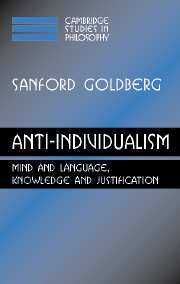Book contents
- Frontmatter
- Contents
- Preface
- Introduction
- Part I SEMANTIC ANTI-INDIVIDUALISM
- Part II EPISTEMIC ANTI-INDIVIDUALISM
- 5 The epistemic dimension of knowledge communication: towards an anti-individualistic approach
- 6 The objection from gullibility
- 7 The objection from rationality
- 8 Towards an ‘active’ epistemic anti-individualism
- References
- Index
5 - The epistemic dimension of knowledge communication: towards an anti-individualistic approach
Published online by Cambridge University Press: 22 September 2009
- Frontmatter
- Contents
- Preface
- Introduction
- Part I SEMANTIC ANTI-INDIVIDUALISM
- Part II EPISTEMIC ANTI-INDIVIDUALISM
- 5 The epistemic dimension of knowledge communication: towards an anti-individualistic approach
- 6 The objection from gullibility
- 7 The objection from rationality
- 8 Towards an ‘active’ epistemic anti-individualism
- References
- Index
Summary
INTRODUCTION TO PART II
In chapter 1 I presented three conditions as necessary conditions on testimonial knowledge: the hearer must rely epistemically on what in fact was reliable testimony; the hearer must reliably comprehend the testimony; and the hearer's acceptance of the testimony must be grounded in her capacity for reliably discriminating reliable from unreliable testimony. Chapters 2–4 then focused on the reliable comprehension condition, as a way to motivate several semantically anti-individualistic results. Here I begin the first of four chapters that will explore factors more standardly discussed in connection with the epistemological dimension of knowledge communication. In particular, I will be focusing on the testimonial reliability and reliable discrimination conditions. In doing so, I will be assuming that the subjects I discuss have attained a reliable comprehension of the testimony they observed. The question, rather, will be: What else must be the case, if such subjects are to count as having attained justified belief and/or knowledge through their acceptance of the testimony?
In addressing questions such as these, my ambition in Part II is two-fold. Narrowly, I want to argue that the three conditions, presented so far as necessary conditions on testimonial knowledge, are also sufficient. Here I drop the pretense of epistemic neutrality, as I aim to endorse and defend something like a reliabilist account of knowledge and justification in connection with testimonial belief. As a reliabilist account, the position is an instance of epistemic externalism regarding both knowledge and justification.
- Type
- Chapter
- Information
- Anti-IndividualismMind and Language, Knowledge and Justification, pp. 133 - 155Publisher: Cambridge University PressPrint publication year: 2007



